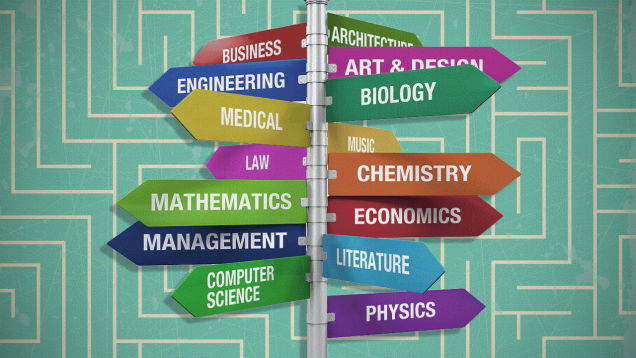
Choosing one’s major is a critical decision.
Luckily for Pepperdine’s freshmen, it does not have to be a permanent one.
Students said they stressed over what major to choose and felt like they were lagging behind in terms of their career path if they dawdled over the decision.
This pressure, in addition to parental and societal influences, often prevents students from picking a major solely based on their passions and interests. Pepperdine administrators, however, said they want students to have some room to explore, allowing them to change majors as late as their junior year. It is a balancing act between allowing students to change their minds while still making sure they graduate on time.
“Number one, I think that students and parents stress too much over finding the right major even before they come to college,” Business Administration Division Chair Jere Yates said. “You’re being asked to pick a career major before you even know who you are and what’s out there.”
Students are often the most resistant to the idea of changing majors, believing doing so brands them with a negative connotation, administrators said.
“Students are trying to relieve the anxiety of ‘If I don’t pick a major right now I’m going to be missing out and there’s something wrong with me,’” Dean of Students Mark Davis said.
A fall 2012 survey of 70 Pepperdine students found that nearly 41 percent said they declared a major and then changed or plan on changing it, slightly more than 46 percent have declared and do not plan on changing it, and just shy of 13 percent remain undeclared.
“There is a benefit in having the option to change majors,” Religion Division Chair Timothy Willis said. “It demonstrates the fact that individuals between the ages of 18 and 22 are still discovering who they are.”
Some students enter college knowing what major they want to pursue, while others use general education courses, internships, research or the Career Center as methods of exploration, OneStop counselors said.
Students said they feel their main anxiety about changing majors stems from not having enough time to complete the necessary units to graduate in four years.
“There are a lot of good resources, like OneStop, that make changing majors pretty simple,” freshman interpersonal communication major Chloe Walton said. “It’s just overwhelming trying to figure out the units, how to fit it all without having to take summer school or a fifth year.”
OneStop and Academic Advising counselors are available yearlong to assist in the hunt for the major that most fits the specific student’s mold.
“The majority (of students) who change their major are first- and second-year students,” Academic Advising Director Andrea Harris said.
But upperclassmen receive priority when it comes to registering for classes in order to complete the requirements to graduate on time, counselors said.
Willis said he was surprised students thought they had to stay with their initial choice of major, as he changed his major twice as an undergrad.
“I investigated two fields that were of some interest to me at the time,” Willis said. “I was glad for what I learned, but I was also glad it was possible for me to change my mind and still graduate in four years.
“If I had felt obligated to complete my first choice (of major), then I would have resented the final years of my education and felt that I was wasting my time and money in my classes,” Willis continued.
In addition to the worry of extra time and money spent in school as a result of major changes, many students feel parental pressure to pick a major that will lead to a job right out of college and make a good salary, administrators said.
“A lot of people who are college-bound are looking at college as a way to make money,” Davis said. “This affects the major selection, with students asking themselves, ‘What major is most likely going to get me a job?’”
Pepperdine places an emphasis on encouraging students that even a college degree itself, regardless of the type of major, is automatically going to put them in a different financial bracket, administrators said. The university also advocates focusing on finding the major that best fits with one’s passions, rather than which has the most earning potential.
Students are encouraged to find vocations, not just jobs.
“A big part of college is getting in touch with who you are and what you value and what you want for your life,” Yates said. “Certainly as freshmen, they prematurely close the identity search before even looking at different career options.”
Pepperdine’s liberal arts education emphasizes well-roundedness and building character, Davis and others said. Integrating the Christian worldview and ethical standards into every educational path is a must, regardless of the specific major.
“It’s not just about spiritual or character development,” Davis said, “it’s also about teaching students how to think.”
Administrators said they try to guide students toward their interests, putting them in touch with the Career Center for guidance on the right major.
Davis said some students do come in with a clear sense of their occupational calling, but most don’t.
“Some students may have the clear sense, knowing they’re going to be doctors or lawyers or artists,” Davis said. “But that’s not the experience for the majority. Students change majors two or three times on average, and it’s normal for individuals to end up in a career outside of their major.”
Administrators said they also recognize students may change their career path long after they graduate.
“A lot of people end up doing what their major did not prepare them to do,” Yates said. “By the time you’re ready to graduate I use the analogy of being like a sailboat in a harbor. If you stay in the harbor you’re never going to get anywhere. At some point you need to get out of college and make adjustments with your career and not your college courses,” Yates said.
Staying in the same career for 30 years is also unlikely.
“I think the days are over when students used to graduate, go into a career and stay there for their whole life,” Davis said. “Learning all the fundamentals, working together in groups — if you focus on that, you’re equipping yourself for multiple careers, regardless of your major here at Pepperdine.”
The university continues to uphold the importance of moral values being in line with one’s actions, all while placing God at the center of it all.
“As a Christian, I believe that there is a connection between the tasks that we enjoy doing and the God who created us,” Willis said. “The career we pursue should contribute to a sense of fulfillment that we seek to enjoy in our unique and personal relationship with God.”
Louise Dequilla completed this story in Dr. Christina Littlefield’s fall 2012 Jour 241 class.extr



